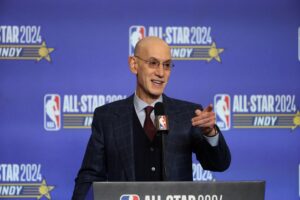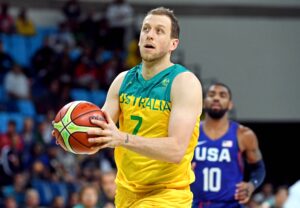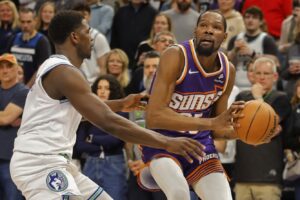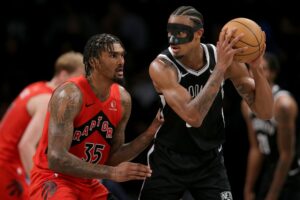Last Word on Pro Basketball is giving you an NBA Playoffs preview for each series as it begins inside the bubble.
The stage is set in Orlando for the third-seeded Denver Nuggets and the sixth-seeded Utah Jazz to face off in the first round. Both teams are not at full strength, and consequently, each will likely deploy a variety of unorthodox lineups. Moreover, both squads look evenly matched and equally uninspiring, as they both went an unremarkable 3-5 in the bubble. All in all, the teams’ identical Orlando records, coupled with last week’s exhilarating double-overtime game, indicate that this series is going to be unpredictable, hard-fought, and exciting.
NBA Playoffs Preview: Denver Nuggets vs. Utah Jazz
Frontcourt
Injuries
A consistent theme among this series will be both teams’ depleted rotations. Both the Jazz and Nuggets will be missing several key cogs who could turn out to be X-factors, especially since the series is projected to be so competitive.
In their frontcourt, the Nuggets will be missing shooting forward Will Barton due to right knee soreness. He played a key role on the squad, averaging 15.1 points, 6.3 rebounds, and 3.7 assists per game. However, it should be noted that Barton did not play in any of the eight seeding games. It will be interesting to see how he adapts to the high-stakes nature of the playoffs.
Meanwhile, the Jazz will be missing backup center Ed Davis for the entirety of the first round. Though his contributions were not always apparent in the box score, his extensive experience would have been invaluable to the Jazz. Now, the Jazz will be relying more on Tony Bradley, a third-year player out of North Carolina, to take on a much more significant role in the playoffs. His inexperience could potentially cause some problems, especially if Rudy Gobert gets into foul trouble.
Denver Nuggets, Utah Jazz Play Style Differences
Additionally, the Jazz and Nuggets have vastly different play styles, and their frontcourts serve different functions. Consequently, both teams have distinct offensive and defensive identities.
The Nuggets run their offense through center Nikola Jokic, with Michael Porter Jr., Paul Millsap, and Jerami Grant being his main beneficiaries. On offense, they don’t attempt many threes, ranking in the bottom five within the NBA for threes made per game. On defense, they are especially adept at offensive rebounding, as they lead the remaining teams in offensive rebounds per game. However, since the Nuggets frequently roll out excessively tall lineups, they don’t have the ability to easily defend the perimeter. Consequently, they have one of the better interior defenses in the league, but they give up a disproportionate amount of threes.
In contrast, the Jazz frontcourt does very little playmaking. Instead, it consists of shooters like Joe Ingles, Royce O’Neale, and Georges Niang to space the floor and stretch defenses thin. These three-and-D wings are very effective from the perimeter, averaging a league-best 38.8 percent from downtown.
Furthermore, center Rudy Gobert leads the league in screen assists, allowing for increased offensive productivity for his teammates. Gobert is also a force on defense, as he’s perhaps the best interior defender in the NBA. As a result, the Jazz are among the best teams at limiting both second-chance points and opponent points in the paint. However, when teams run five-out lineups against the Jazz, they force Gobert to start defending the perimeter, thereby reducing his effectiveness. The more a team can stymie Gobert, the less effective the Jazz defense becomes.
Frontcourt Advantage: Denver Nuggets
At the end of the day, this comes down to the functionality of each team’s frontcourt. Given the Nuggets limited three-point frequency, it’s unlikely that Gobert will be forced out to the perimeter. As a result, expect Gobert to be a monster in the paint. Additionally, the Jazz are the superior defensive rebounding team, and their unparalleled three-point success will inevitably cause problems for the Nuggets.
However, the Jazz don’t really have anyone to defend Michael Porter Jr, who could conceivably be the X-factor of this series. In addition, Jokic, Millsap, and Porter are better than Gobert, O’Neale, and Ingles in a direct comparison. All in all, both the Jazz and Nuggets have distinct edges that are advantageous in their own way. The Nuggets get the edge based on the head-to-head matchup and the possibility that Porter Jr could be completely unleashed.
Backcourt
A number of notable absences will impact both teams. The Jazz will be missing Mike Conley and Bojan Bogdanovic, while the Nuggets will be missing Gary Harris.
Mike Conley is probably the most significant absence. He’ll probably be back by Game 3 of the series, but his unavailability during the first two games could put the Jazz into an early hole. However, if the Jazz give more reps to Ingles as a result, they could overall be a more potent offensive team. After all, if Ingles is utilized more as a point-forward, he could expose the Nuggets’ poor perimeter defense to a greater extent. However, he is a worse defender than Conley, so the net impact of Conley’s absence is likely to be negative.
Neither Harris nor Bogdanovic has played a game in the bubble, and only Harris is eligible to return. It will be interesting to see how Harris will adapt after a five-month offseason. Whether or not he is able to coexist with the emerging Michael Porter Jr remains to be seen, and its outcome could ultimately affect his overall playing time.
When healthy, both teams’ frontcourt looks evenly matched on paper. The Nuggets are led by Jamal Murray, Gary Harris, Torrey Craig, and Monte Morris, while the Jazz are led by Donovan Mitchell, Mike Conley, and Jordan Clarkson.
Distinct Backcourt Differences
The Nuggets backcourt is unique among most NBA teams because it doesn’t have a true point guard. The offense goes through Jokic, but Murray especially is still a force in transition. Even though he was limited by his hamstring in the Nuggets win over the Jazz, Murray still demonstrated newfound growth on the offensive end. He had no turnovers, and he swapped more of his beloved mid-range jumpers for three-point stepbacks. If these changes continue, he could potentially blow the series wide open.
In the absence of Conley, Jordan Clarkson and Donovan Mitchell will need to step up even more. Mitchell has already stated that he wants to be more of a facilitator in this series, which will bode well for his assist totals. If he can feed the hungry Jazz shooters, the team’s offensive efficiency will skyrocket against the poor perimeter defending Nuggets.
While Mitchell is a solid defender, Clarkson is quite poor in that regard. He serves as more of a microwave scorer off the bench than a persistent offensive threat. Consequently, the return of Gary Harris especially could expose Clarkson as the weak link. As long as the offensively-limited Torrey Craig starts at shooting guard, Clarkson’s defensive limitations will probably not be that much of a problem.
Backcourt Advantage: Utah Jazz
The most important aspect of this matchup is the absences. Assuming he returns first, Mike Conley would be the superior player over Torrey Craig based on both offense and defense. The Nuggets do have superior backcourt depth, but it doesn’t compare to the star power of the Jazz backcourt.
Bench
Advantage: Denver Nuggets
This one’s relatively straightforward. The Jazz do not rely on their bench at all. They rank 27th in the NBA in bench minutes per game, and they rank 23rd in bench points per game. Though the Nuggets have a superior bench to the Jazz, they still rank among the bottom of the league in bench productivity. They rank 20th in bench minutes per game, and they rank 18th in bench points per game.
Looking only at depth, the Nuggets simply have a deeper squad. They have 14 players averaging over five points per game, while the Jazz only have 10 such players. With the assured absence of Bojan Bogdanovic and Ed Davis, the Jazz will have a much smaller margin of error.
Also, the return of Harris and Barton will strengthen the Nuggets bench. With the emergence of Porter Jr, the two will probably start on the bench and slowly enter the starting lineup. In the case of Barton, it’s actually very likely that he stays on the bench for the entirety of the playoffs. Taking this into consideration, it’s pretty obvious which team has a deeper and more impactful bench.
Denver Nuggets, Utah Jazz: Intangibles
Based on altitude and history, the Nuggets have the biggest home-court advantage in the league. As a result of the Orlando setting, the Nuggets are at a relative disadvantage compared to normal seasons.
The Jazz are among the best in the NBA at converting isolation plays. On such plays, they generate 6.1 points per game, which ranks 12th in the league, and they score 0.97 points per possession, which ranks second in the league. In contrast, the Nuggets had one of the best on-ball defenses in the NBA prior to the bubble games, but they exhibited one of the worst on-ball defenses in the NBA during the bubble games. The success of the Jazz on iso plays depends on which Denver defense shows up.
Another intangible is chemistry. The Nuggets’ chemistry could be compromised when Barton and Harris return. However, it should not have that much of an impact in the first round, as both players will likely be eased into action. In contrast, the Jazz team chemistry seemed to get better as the seeding games progressed, but now the absence of Conley will disrupt the team’s chemistry.
Intangibles Advantage: Utah Jazz
Another measure of intangibles is the relative amount of hustle that each team demonstrates. The Jazz rank 10th in contested two-point shots, first in screen assists, 29th in deflections, and 30th in loose balls recovered. In contrast, the Nuggets rank 26th in contested two-point shots, 19th in screen assists, eleventh in deflections, and 18th in loose balls recovered. Given the Nuggets’ struggles with away games, on-ball defense, and contested two-point shots, the Jazz get a slight advantage here.
Coaching Advantage: Utah Jazz
Quin Snyder is a much better coach than Michael Malone. He’s far more respected, and he has been widely-renowned for his innovative plays. Snyder has more coaching experience than Malone, and he has more wins.
Furthermore, he has had much more playoff experience, and he was a finalist for Coach of the Year in 2018. That isn’t to say that Malone isn’t a good coach. He’s played around with some intriguing lineups, and his tinkering allowed Michael Porter Jr. to flourish. Despite this, Malone simply does not compare to Snyder.
NBA Playoffs Preview Prediction – Utah Jazz Defeat the Denver Nuggets in Seven Games
In an upset, the Utah Jazz will beat the Denver Nuggets in a best of seven series. This will be a close series, but it truly depends on the returns of Gary Harris and Will Barton. If they don’t return at all, and if Mike Conley does, the Jazz should definitely beat the Nuggets. Even if Barton returns, he’ll still take away minutes from Michael Porter Jr. Since Porter is their biggest threat, this will actually be beneficial for the Jazz. However, if Gary Harris returns relatively early, then the Nuggets hold the advantage over the Jazz.
At the end of the day, this series comes down to which Nuggets defense will show up. The Jazz are the best three-point shooting team, and Nuggets are one of the worst three-point defenses in the NBA. Clearly, the Jazz hold the offensive edge over the Nuggets. If Gobert manages to stay out of foul trouble, they should hold the defensive edge as well. The Nuggets need to improve their on-ball defense to pre-bubble levels to stay competitive.
It’s hard to imagine this series being shorter than six games. Though this series is probably as close to a toss-up as any other in this year’s playoffs, the differences in chemistry, playstyle, and coaching are why the Jazz will win the series.
Main Photo
Embed from Getty Images






